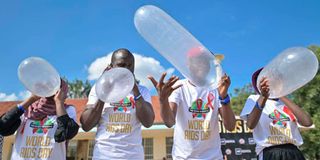Equip the youth with right tools to end Aids epidemic

Peer educators compete in inflating condoms during a 'condom Olympics' presided over by self declared 'Africa King of Condoms', Stanley Ngara, during the World Aids Day commemoration at Kenyatta University in Nairobi on December 01, 2021.
What you need to know:
- HIV/Aids is a serious global public health concern, having claimed 36.3 million lives to date.
- Being HIV-positive is not the end of life; neither is it something to be ashamed of.
WhatsApp messages have been going round of some young University of Nairobi students intentionally infecting other people with HIV/Aids, claiming that they will not suffer alone. With official figures showing the demographic with the highest percentage of people living with HIV being adolescents and youth, this is worrying.
HIV/Aids is a serious global public health concern, having claimed 36.3 million lives to date. According to 2020 reports, 680,000 people died of HIV-related causes and 1.5 were newly infected with the disease. Some 133,455 adolescents are reportedly living with HIV in Kenya, with 18,004 new infections and 2,797 deaths annually among the demographic.
Being HIV-positive is not the end of life; neither is it something to be ashamed of. You can still have an active, quality and healthy life. There is a need to live positively, practise safe sexual behaviour, get tested and be on treatment — even when you don’t think you are at risk but engage in sexual activities.
Health workers should create more awareness for HIV-positive people to know the importance of taking precautions and adhering to medication. Adherence to ARVs prevents HIV from multiplying and, hence, increasing the risk of drug resistance and causing treatment failure. Some 28.2 million people were accessing ARVs as of June 30, last year.
Reduced HIV infections
Medication adherence can be difficult for children and adolescents. And, in many instances, especially for adolescents and youth, they may skip their medication to avoid stigma by hiding their HIV status from friends, mainly because they contract the virus through sexual transmission.
Besides, access to factual comprehensive sexuality education (CSE) information is important for adolescents as it increases their level of sexual responsibility, leading to improved health indicators such as reduced HIV infections, sexually transmitted infections (STIs) and teenage pregnancy. Knowing your HIV status, and your partner’s, is crucial; it reinforces the practice of safe sex to protect your loved ones.
Pre-exposure prophylaxis (PrEP) taken as prescribed before sexual activity to prevent HIV is highly effective. It reduces the risk of getting HIV from sex by about 99 per cent, according to the CDC. A victim of sexual abuse or condom burst should start post-exposure prophylaxis (PEP) within 72 hours and the earlier the better. You can also do an HIV test; however, because of the short window period, it may not give accurate result.
The government should ensure that free PrEP and PEPs are widely available. It should ensure that young people and adolescents have access to the information and tools to make healthy decisions. Reports show HIV prevalence dropped from six per cent to four per cent from 2013 to 2021 while new infections fell by 68.4 per cent. But if the WhatsApp messages are factual, then we have a big problem.
Ms Kathia is a sexual and reproductive health and rights youth advocate at Naya Kenya. [email protected]





